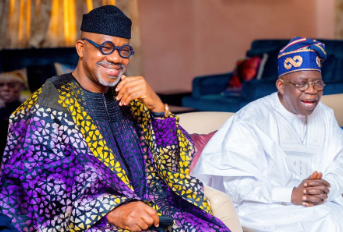By Jemimah Wellington, JKNMedia Reporter
OGUN STATE Governor Dapo Abiodun announced that President Bola Ahmed Tinubu’s re-election as Chairman of the Economic Community of West African States (ECOWAS) underscores his exceptional leadership.
Abiodun, in his congratulatory message on Sunday, emphasized that Tinubu’s re-election signifies the unwavering trust and confidence the sub-region has in his capabilities.
He praised President Tinubu for laying a robust framework for regional integration and enhancing security over the past two years and highlighted the president’s strategic handling of the political crises in Mali, Burkina Faso, and Niger, which helped avert potential regional conflicts.
Under Tinubu’s leadership, ECOWAS has achieved significant progress in economic integration, regional peace, and cooperation among member states, adding that his dedication to advancing West Africa’s interests has been evident throughout his tenure, and his re-appointment promises to further accelerate these achievements, Abiodun stated.
Tinubu’s commitment to dialogue has also successfully addressed threats to democracy and security, preventing what could have escalated into regional warfare as Abiodun called on all member states to support President Tinubu in promoting ECOWAS’s objectives and values.
PPP to Ease Doing Business
IN ANOTHER development, Ogun State Head of Service, Mr. Kehinde Onasanya, announced that Ogun State leads other Nigerian states in Ease of Doing Business due to the effective implementation of Public-Private Partnership (PPP) projects.
Onasanya made this known during the launch of the book “Practical Guide to Public-Private Partnership Arrangement in Nigeria” by Pastor Adebisi Sogunle at the Waterfalls Events Centre in Ikeja, Lagos.
Since passing the PPP law in 2019, Ogun State has facilitated numerous infrastructure projects, including the rehabilitation and expansion of road networks and the reconstruction of the Ijebu-Ode-Epe Expressway.
Onasanya explained that the PPP initiative leverages the strengths of both the public and private sectors to achieve outcomes that neither could accomplish alone.
Under Governor Abiodun’s leadership, Ogun State has utilized PPP to drive significant development and create an enabling environment for economic growth and individual prosperity.
Key projects include the Agro Cargo Airport, which aims to boost the agro-industrial sector by facilitating the export of agricultural products, and several housing developments to address the housing deficit.
Additionally, the Lisabi Mini Power project, developed in partnership with the private sector, generates 4.5 MW of power for the state.
Onasanya highlighted other ongoing PPP projects such as the Olokola Deep Sea Port, Sagamu Trailer Park, Sagamu Stadium, Hillcrest Estate, PMB Estate, Lomiro Oil Palm, OGSG Pharmaceuticals, OGSG Forestry project, Gateway Hotel Ota, and the Inland Dry Port at Kajola/Papalanto.
The Head of Service commended the book’s author, Pastor Sogunle, for his valuable contribution to the discourse on PPP, noting that the book will guide policymakers, practitioners, and investors in navigating PPP complexities in Nigeria.
He urged public servants and private sector partners to apply the book’s lessons in their endeavours.
Former Minister of Information and Culture, Alhaji Lai Mohammed, praised the book’s timeliness, noting that government alone cannot maintain all its assets, and PPP arrangements are essential, citing Ogun State’s infrastructure projects as examples of successful PPPs that have created job opportunities and attracted more investors.
Dr. Chris Iziguzor, National President of the Nigeria Union of Journalists (NUJ), echoed these sentiments, stating that the PPP initiative has significantly contributed to Ogun State’s infrastructural development, drawing more investors and creating jobs.
Pastor Sogunle, expressing gratitude to his supporters, shared that his book is based on his experiences with a PPP programme in Cross River State and emphasized the importance of stakeholder collaboration in maintaining political, economic, and administrative stability in PPP arrangements.





